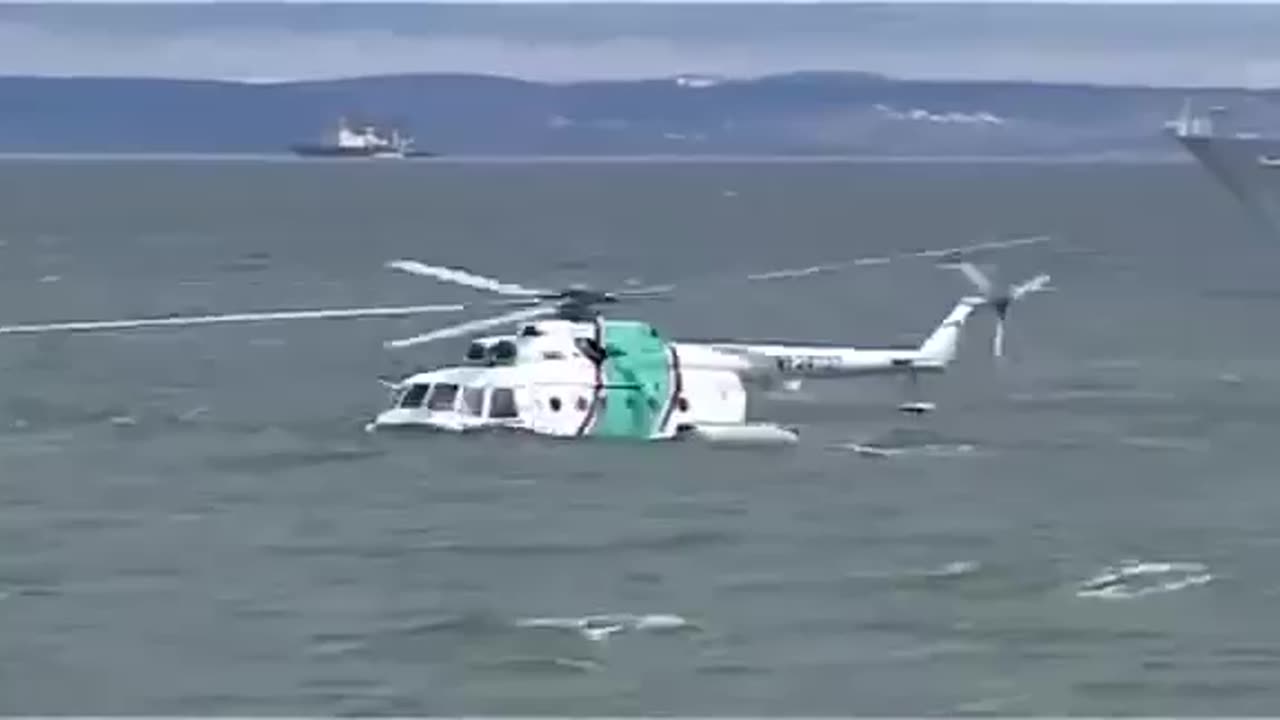Premium Only Content

Mi-14PS search and rescue helicopter crashed.
On May 11, 2006, during joint Russian-Japanese exercises for assisting vessels in distress and oil spill cleanup in Aniva Bay (Sea of Okhotsk, off the coast of Sakhalin), a Mi-14PS search and rescue helicopter crashed.
According to the exercise scenario, the helicopter was supposed to land on water, deploy an inflatable raft, and pick up two conditionally "distressed" people on board. The Mi-14PS, being an amphibious helicopter, was specially designed for such operations — it could land on water, move on its surface, and take off.
However, during the scenario, immediately after takeoff from the water at about 5 meters altitude, there was a sudden and sharp loss of thrust from both engines. The helicopter sharply descended and made a rough water landing. Upon hard impact with the water, partial destruction of the onboard radar station fairing located under the nose of the fuselage occurred. Through the resulting holes, seawater began to enter the helicopter.
The crew restored engine RPMs and, without confirming the absence of damage and without eliminating the longitudinal oscillation of the aircraft, made a hasty decision to take off. However, the water that entered the helicopter (estimated about 1.5 tons) changed the center of gravity and increased the flight weight. This led to the helicopter's nose digging into the water during the takeoff attempt, after which the main rotor blades touched the sea surface.
When the main rotor blades were damaged and unbalanced, the blades struck the tail boom, severing it. The helicopter flipped over (capsized) and remained drifting upside down on the water surface. The capsizing was also facilitated by the spontaneous landing gear release upon water landing.
The main cause of the crash was engine failure; one of the considered versions is that engine air intakes iced up. This phenomenon is especially dangerous as it can cause a sharp reduction in engine power due to reduced air intake. Icing could have occurred at relatively low outside air temperatures under conditions of high humidity over the sea.
Unfortunately, not all on board could be saved, and one person died. 😢
#crash
Beautiful planes ✈️
-
 LIVE
LIVE
Pop Culture Crisis
1 hour agoCoca-Cola's WAR ON CHRISTMAS, Movie Press Tour CRINGE, Gen Z HATES Gen Z | Ep, 949
672 watching -
 1:10:24
1:10:24
Steve-O's Wild Ride! Podcast
5 days ago $0.05 earnedMatt McCusker Makes Steve-O Nervous | Wild Ride #272
7501 -
 16:30
16:30
Clintonjaws
16 hours ago $0.18 earned'The View's' Producer Stops Show & Forces Whoopie To Correct Lie
932 -
 1:22:54
1:22:54
DeVory Darkins
3 hours agoTrump makes shocking announcement as Major ELECTION UPDATE drops after bomb threat
71.5K28 -
 17:09
17:09
Bearing
8 hours agoHasan Goes NUCLEAR On Chat ☢️ ROASTED By JD Vance Over Dog Allegations 🚨
2K26 -
 10:11
10:11
Dr. Nick Zyrowski
8 days agoDoes Creatine CAUSE Hair Loss? (We All Got This Wrong)
9121 -
 1:09:24
1:09:24
Timcast
3 hours agoZohran Mamdani BLAMES Trump Over Bomb Threats At Polling Locations
125K75 -
 3:09:52
3:09:52
Right Side Broadcasting Network
5 hours agoLIVE REPLAY: White House Press Secretary Karoline Leavitt Holds a Press Briefing - 11/4/25
53.6K13 -
 1:58:04
1:58:04
The Charlie Kirk Show
3 hours agoGo Vote! + Healthcare and the Shutdown | Dr. Oz, Baris | 11.4.2025
57.8K8 -
 58:49
58:49
The White House
4 hours agoPress Secretary Karoline Leavitt Briefs Members of the Media, Nov. 4, 2025
20.1K15